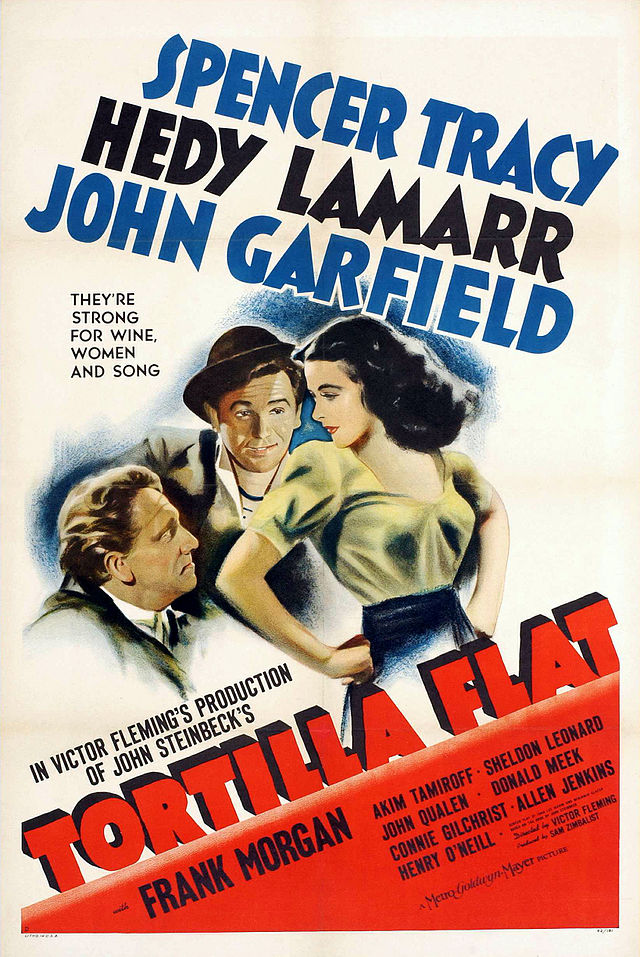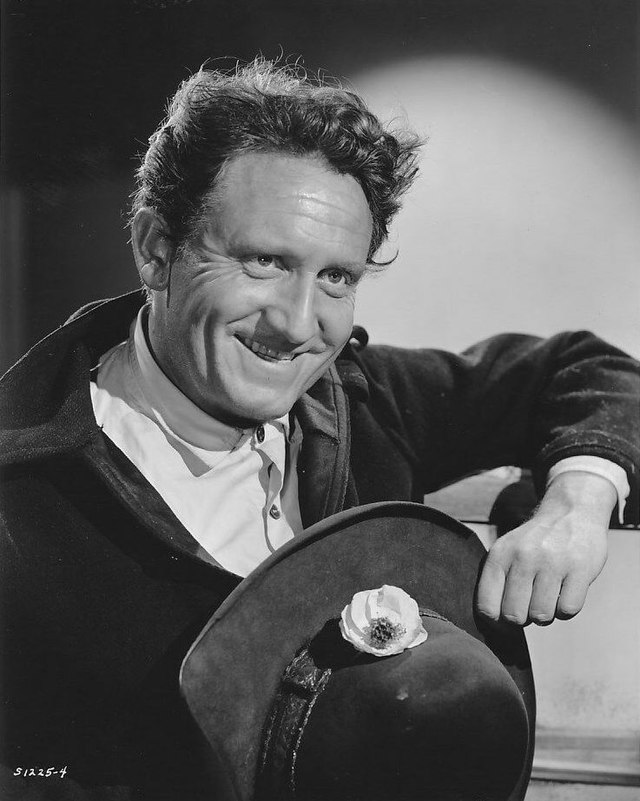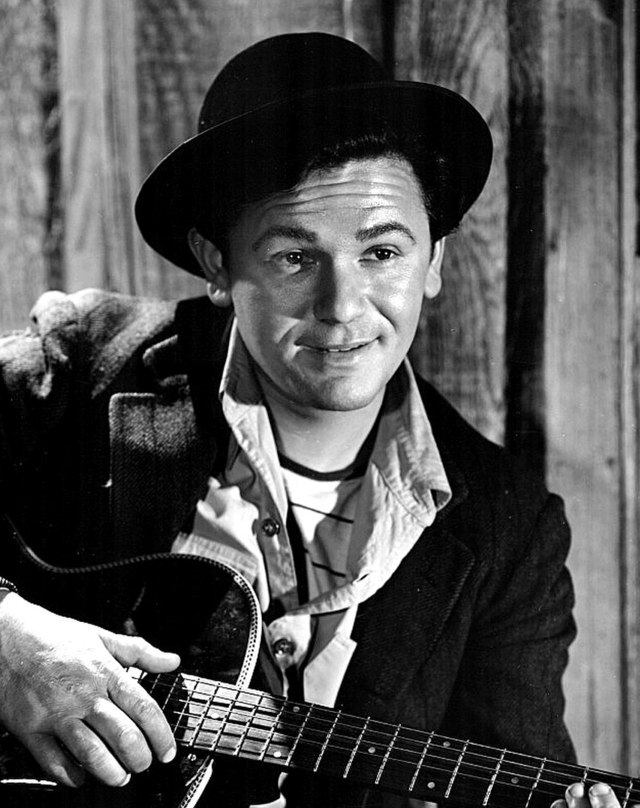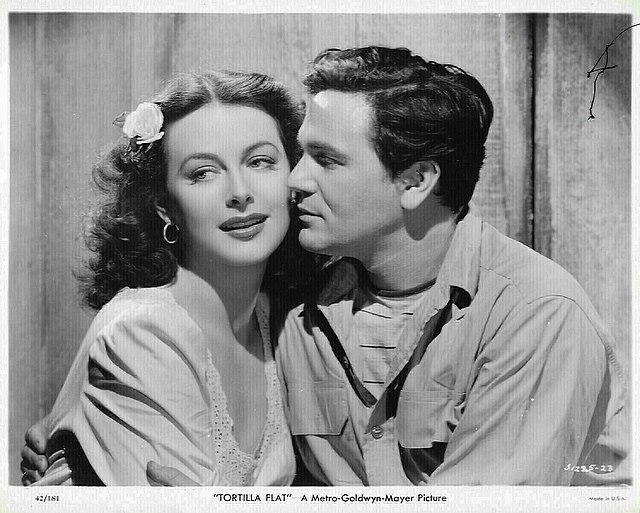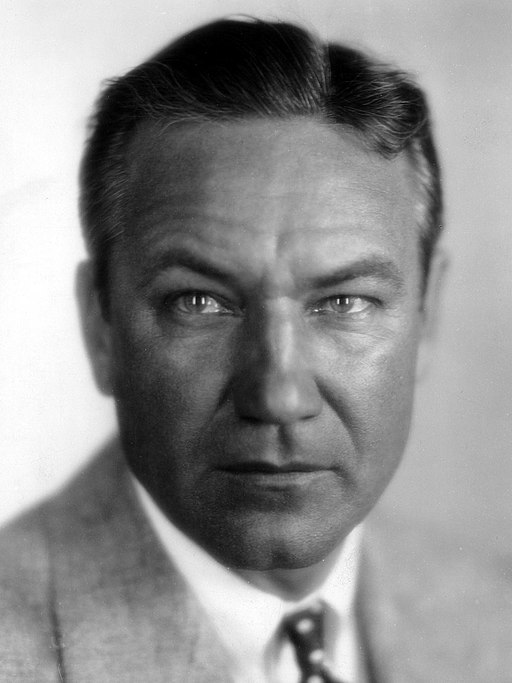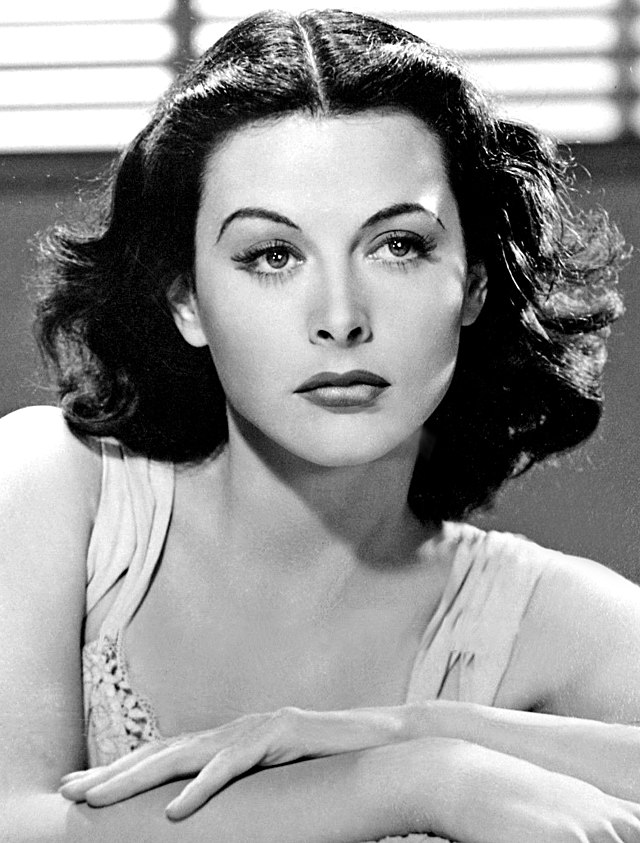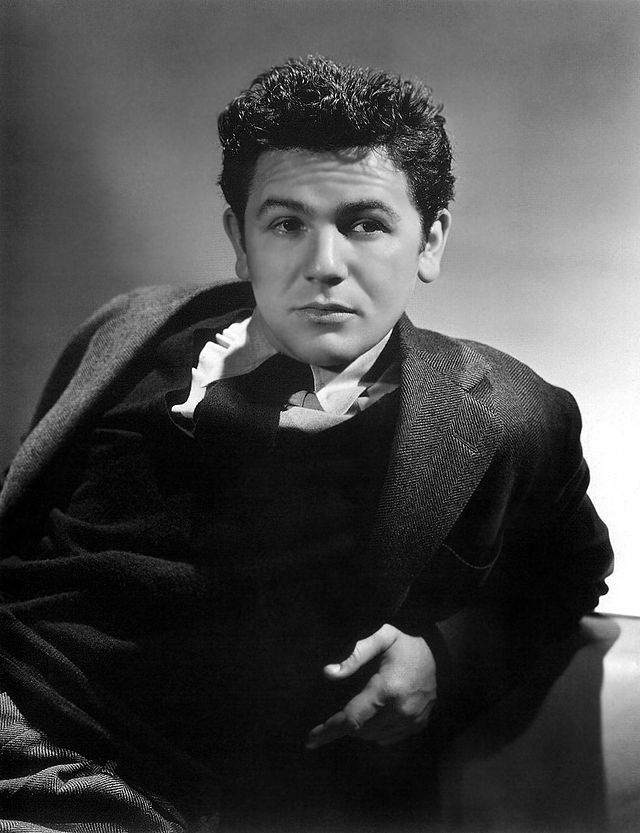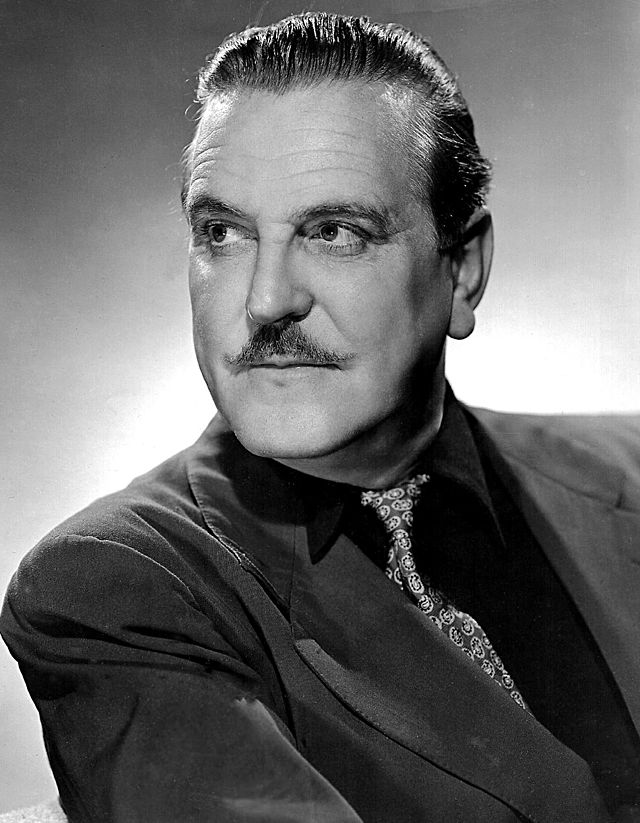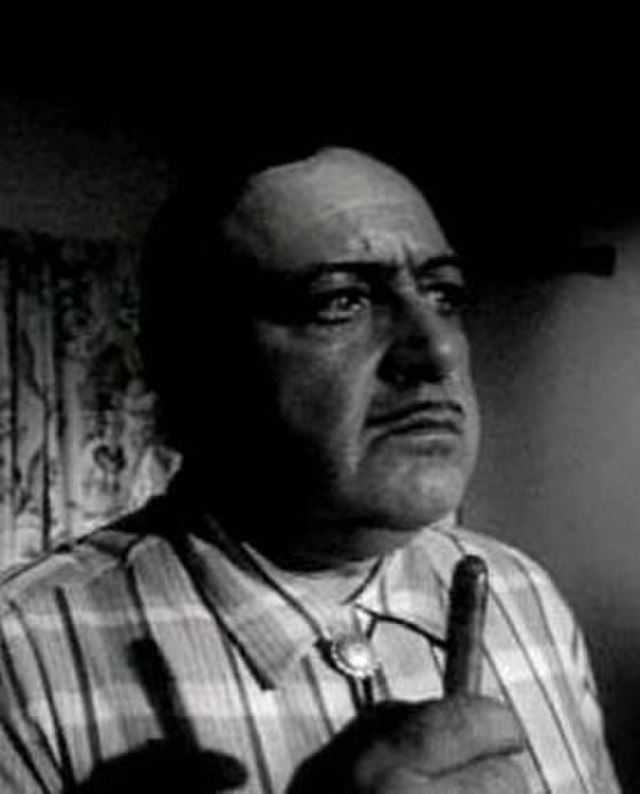Tortilla Flat – 1942
Based on John Steinbeck's 1935 novel, Tortilla Flat explores the lives of a close-knit group of paisanos—people of mixed Spanish, Native American, and Caucasian heritage—who live on the outskirts of society in Monterey, California. It captures a story rich with friendship, love, and moral choices, celebrating a lifestyle that values simplicity, loyalty, and a sense of community.
Plot Summary
The story follows Danny (played by John Garfield), a carefree, occasionally reckless drifter whose life changes when he unexpectedly inherits two small houses in the coastal neighborhood of Tortilla Flat. This sudden inheritance disrupts Danny's simple life; as a man with no desire for possessions or responsibilities, he feels uneasy about the newfound property. Yet, his two homes become a communal haven for his friends and the center of their adventures.
Pilon (Spencer Tracy), Danny’s closest friend, is a charming rogue and a shrewd talker who convinces Danny to let him stay in one of the houses, rent-free. Soon after, Pablo (Akim Tamiroff), another of their friends, joins them, and together they set up a home where good wine, laughs, and companionship come above all else. The three friends become a kind of family, reveling in their modest lifestyle and shared mischief.
A significant subplot involves The Pirate (Frank Morgan), a gentle, somewhat dim-witted man with a pack of loyal dogs and a dream. The Pirate is saving every penny he earns to buy a gold candlestick as an offering to St. Francis, in gratitude for the recovery of his beloved dog. Initially, Pilon sees an opportunity to exploit The Pirate’s naivety, but as the story progresses, Pilon’s conscience awakens. He not only vows to protect The Pirate but also becomes his sincere friend and supporter, even helping him with his noble quest.
Romance enters the plot through Dolores Ramirez (Hedy Lamarr), a beautiful and pragmatic young woman who captures Danny's interest. Dolores dreams of stability and security, a life Danny isn’t sure he can provide. Her affection challenges him, forcing him to confront his aversion to responsibility and commitment. Danny and Dolores share a complex relationship marked by a mutual attraction, but they clash over Danny’s carefree attitude and the company he keeps. Dolores sees his friends as a hindrance to his potential, hoping to shape him into a more reliable man.
Over time, the weight of his inheritance and his new role as a property owner begin to oppress Danny. He feels trapped by responsibilities he never asked for, and the expectations of others start to chafe against his need for freedom. This internal conflict drives Danny into reckless behavior, distancing him from his friends. His alienation climaxes when he spirals into a self-destructive path, fueled by drink and despair.
In the end, Danny suffers a tragic accident during one of his reckless episodes, and his friends gather to honor him in a final act of loyalty and respect. In Danny's absence, Pilon, Pablo, The Pirate, and their community find a renewed sense of unity and commitment to each other, realizing that their bond and shared values are what truly hold them together.
Analysis
From Tortilla Flat presents a nuanced exploration of human relationships, social roles, and the complexities of friendship, freedom, and moral choice. Set against the backdrop of the Depression-era United States, it combines humor, pathos, and social commentary to create a compelling narrative about the lives of those living on society’s margins.
Friendship and Loyalty
At the heart of Tortilla Flat is the portrayal of friendship as a powerful, sustaining force. Danny and his friends may lack material wealth, but their relationships enrich their lives. Pilon, initially driven by self-interest, undergoes a transformation through his bond with The Pirate, coming to realize the importance of compassion and loyalty. The characters’ loyalty to each other transcends individual shortcomings, emphasizing that true friendship involves not just celebration but also sacrifice and mutual support. This theme reaches its poignant conclusion when the friends come together in the wake of Danny’s tragic accident, showing that despite their flaws, they care deeply for each other.
Freedom vs. Responsibility
Danny’s inheritance serves as both a blessing and a curse. On one hand, it offers him material comfort and a stable foundation; on the other, it imposes responsibilities that conflict with his free-spirited nature. Throughout the film, Danny grapples with these opposing forces, feeling the weight of societal expectations that come with property ownership. His relationship with Dolores is similarly strained, as she represents the desire for stability and commitment—values that Danny resists because they threaten the carefree life he cherishes. This struggle between freedom and responsibility is a central conflict, ultimately leading Danny to confront what he truly values.
Class and Community
The residents of Tortilla Flat belong to a social class that is often overlooked and marginalized. Yet, the film portrays them with dignity and empathy, highlighting their resilience, generosity, and humor. Tortilla Flat does not glamorize poverty but instead shows how these characters create lives rich with meaning and warmth, despite limited means. The film’s community of paisanos is depicted as vibrant and alive, fostering a sense of belonging and kinship that stands in stark contrast to conventional success. The story invites viewers to see the humanity in communities often ignored or dismissed by mainstream society.
Moral Growth and Redemption
Pilon’s character arc offers an exploration of moral growth. He begins the story as a lovable rogue, often selfish and prone to manipulation. However, as he grows closer to The Pirate, his moral compass shifts, and he becomes genuinely protective of his friend. This transformation is one of the film’s most powerful elements, showing that people can change for the better when they form meaningful connections with others. Pilon’s redemption underscores the idea that even flawed characters can find a path to goodness through empathy and responsibility.
Cinematic Style and Performances
Victor Fleming’s direction, alongside Karl Freund’s cinematography, brings an evocative visual style to the film. The rugged beauty of Monterey’s coastal landscapes, combined with the intimate setting of the characters’ modest homes, creates a vivid backdrop that enhances the story’s emotional depth. The cinematography lends warmth to scenes of friendship and playfulness, while more somber moments are rendered with a quiet, understated beauty.
The cast’s performances are also instrumental in bringing the characters to life. Spencer Tracy delivers a complex portrayal of Pilon, blending charm with layers of self-reflection. Frank Morgan’s role as The Pirate adds a layer of innocence and sincerity, bringing a touching vulnerability to the story. John Garfield’s performance as Danny captures the inner conflict of a man torn between love and freedom, while Hedy Lamarr gives depth to Dolores, a woman whose love for Danny is tempered by a realistic understanding of his limitations.
Franz Waxman’s musical score provides a fitting emotional backdrop, oscillating between whimsical themes that reflect the characters’ lighthearted camaraderie and more poignant compositions that underscore moments of reflection and loss.
Legacy and Themes
Tortilla Flat leaves a lasting impression with its themes of loyalty, redemption, and the search for meaning in a world that often prioritizes wealth and status over genuine connection. The film’s exploration of unconventional lives is a testament to the resilience and strength of those who, despite their struggles, find joy and purpose through companionship. Danny’s journey captures the universal struggle between societal expectations and personal freedom, while the story as a whole celebrates the human spirit's ability to find happiness in simplicity and unity.
In the end, Tortilla Flat is a bittersweet narrative about belonging, friendship, and the courage to remain true to oneself. Its characters remind viewers that while life may be challenging and filled with loss, community and loyalty can provide the stability and strength needed to endure. The film stands as a tribute to the enduring power of friendship and the simple beauty of a life lived in harmony with others.
Classic Trailer Tortilla Flat
Full Cast
• Spencer Tracy as Pilon
• Hedy Lamarr as Dolores Ramirez
• John Garfield as Danny
• Frank Morgan as The Pirate
• Akim Tamiroff as Pablo
• Sheldon Leonard as Tito Ralph
• John Qualen as Jose Maria Corcoran
• Donald Meek as Father Ramon
• Connie Gilchrist as Mrs. Torrelli
• Henry O'Neill as Mr. Brown
• Virginia Sale as Woman in Post Office (uncredited)
• Arthur Space as Ambulance Driver (uncredited)
• George Magrill as Arresting Policeman (uncredited)
Character-Driven Direction of Victor Fleming
Victor Fleming’s direction in Tortilla Flat is instrumental in bringing depth, warmth, and authenticity to the film's portrayal of a unique community on the fringes of society. Known for directing large-scale films like Gone with the Wind and The Wizard of Oz, Fleming brings his cinematic expertise to a much more intimate, character-driven story with Tortilla Flat, creating a film that resonates emotionally while respecting the simplicity and charm of Steinbeck’s source material.
Visual and Emotional Tone
Fleming captures both the rugged beauty and the rough simplicity of Monterey, California, establishing a sense of place that becomes an essential part of the story. The dusty streets, modest homes, and coastal landscapes are rendered with a painterly quality, emphasizing the harmony between the characters and their environment. Fleming uses naturalistic, warm lighting to accentuate the communal gatherings, drinking sessions, and moments of laughter, creating a cozy, inviting atmosphere that makes Tortilla Flat feel like a real place—alive, worn, and beloved by its residents. This visual warmth contrasts with the tension that emerges when Danny's sense of freedom is threatened, allowing the audience to feel the emotional stakes as well as see them.
Character-Driven Storytelling
Fleming’s direction shines in his handling of the ensemble cast. He gives each character room to breathe, with every scene thoughtfully directed to highlight the unique qualities, quirks, and relationships of the main characters. Spencer Tracy’s Pilon, for instance, is given moments to show both his roguish charm and his inner moral conflict. Fleming carefully balances Pilon’s humor with his emerging sense of conscience, helping Tracy create a nuanced portrayal that doesn’t overshadow the rest of the cast. Similarly, Fleming’s direction of Frank Morgan as The Pirate brings out the character’s vulnerability and sweetness, allowing the audience to connect emotionally with his simple yet heartfelt dreams.
Fleming’s handling of John Garfield as Danny also deserves mention. Danny is a complex character—both a leader and an outcast in his own way, caught between his desire for independence and the pull of his friends and community. Under Fleming’s direction, Garfield portrays Danny’s struggles with authenticity, capturing the character’s restlessness, his charisma, and ultimately, his inner turmoil as he faces the responsibilities his inheritance brings. Through Garfield, Fleming portrays the central conflict of the story: the clash between freedom and the obligations of property and relationships.
Balancing Comedy and Drama
Tortilla Flat is a film that flows between comedy and drama, and Fleming orchestrates this balance with skill. He never allows the humor to undercut the film’s emotional weight, nor does he let the drama become too heavy-handed. The comedic elements—such as Pilon’s scheming or the friends’ lighthearted wine-drinking sessions—serve as windows into the characters’ personalities and relationships, enhancing rather than distracting from the story’s deeper themes. By weaving these moments naturally into the narrative, Fleming maintains a realistic tone that prevents the film from becoming overly sentimental or trivializing the struggles of the characters.
Exploration of Themes
Fleming’s direction gives space to Steinbeck’s thematic underpinnings, such as friendship, poverty, freedom, and moral growth. Rather than impose a heavy-handed message, Fleming allows these themes to emerge organically from the characters’ interactions and choices. He captures the bittersweet reality of Danny’s journey, emphasizing the price of freedom and the emotional toll of societal expectations. Under Fleming’s guidance, the film becomes a subtle meditation on the cost of “civilization” and material ownership—showing that, for some, true wealth lies not in property but in connection, loyalty, and independence.
Use of Music and Sound
Franz Waxman’s score, under Fleming’s direction, complements the story’s emotional range. The music shifts fluidly between the light-hearted moments among friends to the more somber reflections on Danny’s journey. Fleming allows the music to support, rather than dictate, the mood of each scene, using sound sparingly to enhance emotional transitions. For example, scenes between Danny and Dolores are given a softer, more intimate score that highlights their tension, while scenes of friendship and mischief have a livelier, more upbeat tone. This musical contrast, subtly guided by Fleming, helps to underline the film’s central conflicts without overwhelming the dialogue and performances.
Final Reflection
Victor Fleming’s direction in Tortilla Flat is a masterclass in balancing character development, thematic depth, and visual storytelling. He honors Steinbeck’s work by emphasizing the humanity of each character and their shared experience of life on the edges of society. Fleming’s ability to let the story breathe, without rushing through the emotional arcs or forcing a resolution, adds to the film’s lasting impact, allowing audiences to reflect on the characters long after the movie ends. His work in Tortilla Flat proves that he is as adept at capturing intimate stories as he is at handling epic tales, revealing a director with a keen understanding of human nature and a respect for the beauty in life’s simplicity.
Spencer Tracy’s Charismatic Perfomance
Spencer Tracy’s performance as Pilon in Tortilla Flat is a fascinating blend of charm, humor, and subtle emotional depth. Tracy brings to life a character who is both a schemer and a loyal friend, embodying the complex and endearing traits of Pilon with authenticity and ease. Known for his naturalistic acting style, Tracy’s portrayal of Pilon is both captivating and deeply human, providing the film with much of its warmth and emotional resonance.
Charm and Charisma
Tracy infuses Pilon with an effortless charm that makes the character immediately likable, despite his sometimes dubious intentions. Pilon is the kind of person who can talk his way into or out of nearly any situation, and Tracy’s portrayal captures this skill with a smooth, light touch. His sly smile, quick wit, and playful tone make Pilon a delightful character to watch, whether he’s scheming for a free place to live or coaxing his friends into sharing their meager resources. Tracy’s charisma draws viewers into Pilon’s world, making it easy to forgive his less-than-honorable actions because his motives are always laced with a certain innocence and mischievous good humor.
Layered Performance
While Pilon appears to be a simple, carefree character, Tracy gives him a subtle complexity that reveals his inner conflicts. Underneath his humor and charm, Pilon is a man with a conscience, and Tracy carefully reveals these layers throughout the film. Early in the story, Pilon’s actions suggest a purely self-interested man, one who is willing to manipulate his friends for a little comfort or pleasure. However, as the film progresses, Tracy shows Pilon’s moral growth, particularly in his relationship with The Pirate.
One pivotal moment in Tracy’s performance is when Pilon realizes the depth of The Pirate’s devotion to his dream of making an offering to St. Francis. In a few understated gestures—a slight change in facial expression, a softening of his voice—Tracy conveys Pilon’s shift from self-serving mischief-maker to a man who feels genuine affection and responsibility toward his friend. This nuanced portrayal allows the audience to see Pilon as a person who is both flawed and redeemable, a character who can make poor choices but is ultimately guided by a strong, if occasionally hidden, moral compass.
Humor and Timing
Tracy’s impeccable comic timing adds a layer of lightness to the film, making Pilon a source of much of the film’s humor. Whether he’s concocting a new scheme or reacting to the absurdities of his friends, Tracy brings a lively energy to every scene. His delivery of lines is sharp and often playful, perfectly capturing Pilon’s knack for turning a mundane situation into a small adventure. Tracy’s humor is never overplayed or forced; instead, he uses subtle expressions and timing to make Pilon’s antics feel natural and endearing. This skillful use of humor allows Pilon to be a lovable character without becoming a caricature, keeping him grounded in reality.
Emotional Resonance and Vulnerability
Despite Pilon’s outward bravado, Tracy allows glimpses of vulnerability to emerge, especially in his relationships with his friends. His scenes with The Pirate are particularly moving, as Tracy subtly shows Pilon’s growing protectiveness and compassion. In one memorable moment, Pilon realizes the sincerity and innocence of The Pirate’s quest, and Tracy’s expression shifts from bemused tolerance to a profound empathy. This transformation is portrayed with minimal dialogue but with great emotional impact, as Tracy shows Pilon’s internal struggle to reconcile his self-interest with his growing affection for his friend.
Toward the end of the film, as Danny’s situation becomes more troubled, Tracy’s performance becomes more introspective. Pilon’s sorrow and sense of loss at Danny’s decline are evident, with Tracy using small gestures and glances to convey the deep bond he feels for his friend. This emotional subtlety adds depth to Pilon’s character and illustrates Tracy’s ability to bring out the humanity in even the most lighthearted or morally ambiguous roles. Pilon’s loyalty and sorrow in these final scenes reflect a character who has learned, through his friendships, the importance of compassion and responsibility.
Presence and Chemistry with Cast
Tracy’s on-screen presence elevates his scenes, as he commands attention without overshadowing his fellow cast members. His chemistry with John Garfield (Danny) is particularly noteworthy; the two actors create a believable and dynamic friendship that feels genuine and lived-in. Tracy’s Pilon often acts as a grounding force for Danny, supporting him through various ups and downs, while Garfield’s portrayal of Danny highlights the free-spirited nature that both attracts and frustrates Pilon. Tracy’s ability to adapt his performance to the energy of his co-stars adds to the film’s realism and emotional impact.
His interactions with Hedy Lamarr’s Dolores bring a different tone, as Pilon alternates between being wary of her influence on Danny and grudgingly respectful of her straightforwardness. Tracy’s subtle shifts in posture and tone during these scenes show Pilon’s ambivalence, hinting at his internal conflict between loyalty to his friend and skepticism toward change. In scenes with Frank Morgan’s Pirate, Tracy softens, letting Pilon’s protectiveness shine through as he becomes a kind of guardian figure. These moments of connection with each cast member highlight Tracy’s versatility and his ability to build layered relationships with his co-stars.
Final Reflection
Spencer Tracy’s portrayal of Pilon in Tortilla Flat is a masterful blend of humor, depth, and emotional resonance. Through his performance, Tracy captures the essence of a man who is both endearingly flawed and profoundly human, someone who values friendship above all else, even as he struggles with his own shortcomings. Tracy’s ability to balance Pilon’s mischievous spirit with a genuine sense of loyalty and growth brings richness to the character, making him one of the most memorable aspects of the film.
By bringing nuance, authenticity, and warmth to the role, Spencer Tracy turns Pilon into a character who transcends the traditional “lovable rogue” archetype. His performance is a testament to his skill as an actor, demonstrating a deep understanding of human nature and a talent for making even the most unconventional characters relatable. In Tortilla Flat, Tracy leaves a lasting impression, reminding audiences of the power of friendship, the potential for change, and the humor that can be found in even the most challenging of circumstances.
Notable Movie Quotes
• Pilon (Spencer Tracy):
“In Tortilla Flat, we don’t have money, but we have friends. And sometimes, that’s even better.”
• The Pirate (Frank Morgan):
“Every penny I save is a little prayer. And one day, I’ll give it to Saint Francis, and he’ll know my heart is good.”
• Danny (John Garfield):
“I didn’t ask for this house or this land. But somehow, it feels like I’ve got shackles on my feet.”
• Pilon:
“There are two kinds of people in the world: those who share their wine and those who drink alone. Lucky for us, we’re the first kind.”
• Dolores (Hedy Lamarr):
“Danny, love isn’t about what you don’t have. It’s about what you’re willing to give.”
• Pilon:
“A house is just four walls, Danny. It’s what happens inside that makes it a home.”
• Pablo (Akim Tamiroff):
“Life is like wine, amigo. Sometimes it’s bitter, but we drink it anyway.”
• Pilon:
“The Pirate saved every penny for his Saint. Me, I save my pennies for good wine. Maybe we’re both right. Maybe we’re both wrong.”
• Danny:
“Freedom is a funny thing. You don’t know you’re losing it until it’s already gone.”
• Pilon:
“You think you own something because you paid for it? It’s the heart that owns things, not money.”
Classic Scenes from Tortilla Flat
Danny’s Inheritance and the Invitation to Pilon
• In an early scene, Danny learns he has inherited two small houses, a surprising twist of fortune for someone used to living without possessions. While initially excited, he quickly feels burdened by the responsibility, foreshadowing his internal conflict throughout the story. Pilon’s arrival and casual suggestion that he live in one of the houses rent-free is handled with playful humor as he convinces Danny of the “friendship tax” as a form of payment. This scene not only introduces their dynamic but sets the tone for the carefree and communal lifestyle they cherish.
The Pirate’s Money Stash
• One of the most touching scenes involves The Pirate (played by Frank Morgan) revealing his hidden stash of money, saved meticulously over the years to buy a golden candlestick for St. Francis in gratitude for his dog’s recovery. Pilon initially sees this as an opportunity for financial gain but is visibly moved by The Pirate’s innocence and devotion. Tracy’s nuanced reaction as Pilon softens, seeing The Pirate’s sincerity, marks a key turning point for Pilon’s character, showing the beginning of his moral transformation and deepening bond with The Pirate.
The Wine Drinking and Storytelling
• A classic scene of friendship and camaraderie occurs when Danny, Pilon, and their friends gather at Danny’s house to drink wine and share stories. This lively scene embodies the joy they find in each other’s company and the easygoing life they lead. The laughter, storytelling, and sense of freedom are infectious, providing the audience with a glimpse into why these characters value their friendship and lifestyle so highly. This moment serves as a lighthearted escape but also emphasizes the depth of their bond, showing that despite their material poverty, they are rich in companionship.
Danny and Dolores’ Tense Conversations
• The romantic tension between Danny and Dolores plays out in scenes where she pushes him to consider a more stable life. Dolores, portrayed by Hedy Lamarr, represents Danny’s possible path to commitment, but his discomfort and uncertainty are palpable. In these scenes, Danny is visibly torn between his love for Dolores and his loyalty to his friends and freedom. The chemistry between Garfield and Lamarr brings out Danny’s struggle with responsibility, and these conversations highlight the conflicting desires that define his character arc.
Danny’s Descent and Self-Destructive Behavior
• As Danny begins to feel increasingly trapped by his property and responsibilities, he turns to drinking and reckless behavior. A particularly intense scene occurs when Danny, frustrated and overwhelmed, goes on a drinking binge, alienating himself from his friends. This moment marks a tragic turning point, as Danny’s internal struggles surface in a way that damages his relationships. Garfield’s performance here is powerful, conveying Danny’s sense of entrapment and his desperation to escape the life he feels is closing in on him.
The Pirate’s Offering to St. Francis
• Toward the end of the film, The Pirate finally makes his offering to St. Francis with his saved money, a touching and sincere moment that showcases his simple faith and gratitude. This scene is filled with reverence and sincerity, and it reflects the purity of The Pirate’s character. Pilon, along with the other friends, stands by The Pirate’s side, showing their support and newfound respect for his devotion. This moment not only highlights the theme of loyalty but also the idea that faith and friendship can give life meaning, even for those with very little.
Danny’s Farewell and the Friends’ Last Gathering
• In one of the final scenes, Danny’s friends gather together to honor his memory after his tragic accident. They reflect on his life and their shared moments, celebrating his spirit even in the face of loss. This moment is both somber and affirming, showing that their bond will endure despite Danny’s absence. It underscores the lasting impact of friendship and the value they place on community, even as life changes around them. This final gathering brings the story full circle, reinforcing the themes of loyalty, loss, and the resilience of the human spirit.
Awards and Recognition
Tortilla Flat (1942) did not receive a large number of awards or nominations, especially when compared to other films from the same period.
Academy Award Nomination (Oscars)
Best Supporting Actor: Frank Morgan for his role as The Pirate
Frank Morgan’s portrayal of The Pirate, a gentle and devoted character, earned him an Academy Award nomination for Best Supporting Actor. His performance was widely praised for its sincerity and emotional depth, making it a standout in the film.
Aside from this Academy Award nomination, Tortilla Flat didn’t receive other major awards or nominations. While well-regarded for its performances and the charm of its storytelling, the film was somewhat overshadowed by other big releases of 1942, a year that included highly acclaimed films such as Mrs. Miniver and Yankee Doodle Dandy.

